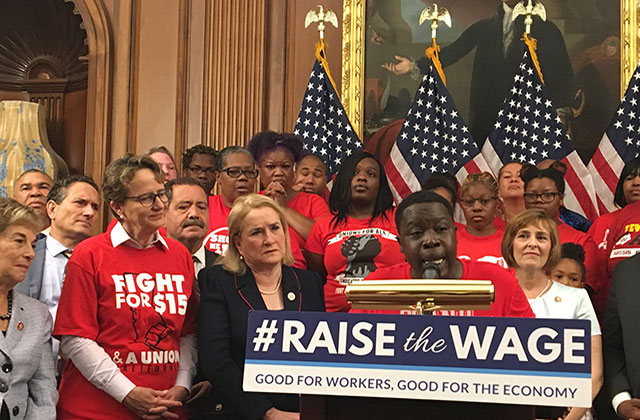The House passed the Raise the Wage Act Thursday (July 18), which seeks to gradually double the federal minimum wage from $7.25 an hour to $15 by 2024, including for tipped workers, The New York Times reports. The federal tipped minimum wage is just $2.13 an hour. Women make up two-thirds of all workers in predominantly tipped jobs, and those who work in the industry are twice as likely to live in poverty compared to other workers. The bill will now continue to the Senate for a vote.
Advocates are applauding the progress. “This is [a] historic vote for millions of working people—especially for women, who are the majority of workers who will see bigger paychecks thanks to the Raise the Wage Act,” the National Women’s Law Center said in a statement. “Across the country, child care workers, home care workers and so many other hardworking women and men will be able to move out of poverty and toward economic security. Restaurant servers, bartenders and other tipped workers—who have been left behind in every previous federal minimum wage increase—will finally be able to depend on a decent paycheck from their employer along with their tips. And all of us will benefit from an economy that values everyone’s work.”
In “The Racist History of Tipping,” an op-ed published in Politico on Tuesday (July 17), Reverend Dr. William J. Barber II breaks down the history of tipped wages in the United States, “You might not think of tipping as a legacy of slavery, but it has a far more racialized history than most Americans realize. Tipping originated in feudal Europe and was imported back to the United States by American travelers eager to seem sophisticated. The practice spread throughout the country after the Civil War as U.S. employers, largely in the hospitality sector, looked for ways to avoid paying formerly enslaved workers.”
Barber goes on to explain the modern-day consequences of this practice:
rnt
A just-released Congressional Budget Office report finds that a $15 minimum wage would have tremendous benefits for low-wage workers of all races and ethnicities. Yet the stakes are particularly high for Black workers. The share who would benefit from the Raise the Wage Act is far larger than the share of White workers who would benefit—38 percent compared with 23 percent.
The 231-199 vote was along partisan lines, after many Republicans staunchly opposed the proposed legislation, claiming it will harm the economy. Three Republicans said yes, while six Democrats opposed it. “In the greatest country on earth, no person who has the dignity of a full-time job should suffer the indignity of not being able to provide for themselves and their loved ones,” Representative Stephanie Murphy (D-Fl.), who voted in favor of the bill, said on the floor.
Others have chimed in to applaud the vote, including Restaurant Opportunities Centers United, which tweeted, “To all of our allies, all the tipped workers who spoke up and spoke out, all the organizers that put boots on the ground fighting for #1FairWage, this is our win.”
rnt
Women and people of color “power some of our largest, fastest-growing, and most important industries.”
rntt
rnttWhen women and people of color do well, so does our economy. We should #RaiseTheWage so that we ALL benefit: https://t.co/eQHatfBBEfrnt— Tax March ? (@taxmarch) July 18, 2019
rn
rnt
Very exciting news that the House passed the $15 minimum wage legislation today. In NYC we are expecting to see 1,000 fewer deaths every year thanks to the new $15 minimum wage, especially among low-income communities of color: https://t.co/SpSlekbpmk #RaiseTheWage pic.twitter.com/fcglATIlNM
rnt— Commissioner Oxiris Barbot (@NYCHealthCommr) July 18, 2019
rn
rnt
One of the best things about the #RaisetheWage Act, passed by the House today, is that is will eliminate the sub minimum wage for tipped workers which has been frozen at $2.13/hr for decades. https://t.co/zUZjqUoGOz
rnt— MoveOn (@MoveOn) July 18, 2019
rn
rnt
VICTORY: the #RaiseTheWage Act passed the House! This is the power of #workers joining together for dignity on the #job ??????.
rntt
rnttThis is a historic step forward, but we can't and won't stop fighting until a #livingwage is a reality for every #worker. #FightFor15 pic.twitter.com/9F36kqAB7Urnt— Nat'l Urban League (@NatUrbanLeague) July 18, 2019
rn
